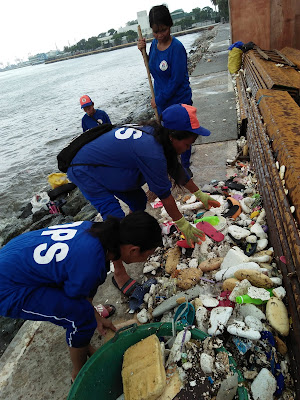Garbage on Manila Bay Breakwater Stirs Up Call for Enforcement of Waste Law
The garbage that has accumulated at the breakwater in Manila Bay prompted a waste and pollution watch group to call anew for the strict enforcement of Republic Act 9003, or the Ecological Solid Waste Management Act.
“The sea sent back the trash from land as if to remind everyone, rich and poor, that whatever we improperly dispose of will return and haunt us,” said Daniel Alejandre, Zero Waste Campaigner, EcoWaste Coalition.
Following the habagat or southwest monsoon rains that flooded many parts of Metro Manila, a team from the group’s Basura Patrol went to the bay area and found plastic bags, straws and other disposables, packaging materials like polystyrene, slippers, wood scraps and water hyacinth washed up along the breakwater creating a dumpsite right next to the US Embassy.
“The carpet of garbage along the shore has once again shown the necessity of getting our acts together to prevent garbage from spilling into the waterways and into Manila Bay. It’s high time for all members of the society to embrace R.A. 9003 ,” Alejandre said.
Waste audits conducted by the EcoWaste Coalition, Cavite Green Coalition, Global Alliance for Incinerator Alternatives, Greenpeace, Mother Earth Foundation, and waste pickers' groups at the Manila Bay in 2016, 2014, 2010 and 2006 found plastic wastes topping the bay’s flotsam. The 2016 waste audit, for example, collected 1,482 kilos of garbage, 79 percent of which were assorted plastic materials.
Enacted in December 2000 six months after the deadly Payatas dumpsite tragedy, R.A. 9003, as written in Section 2 (Declaration of Policies), seeks to “ensure the proper segregation, collection, transport, storage, treatment and disposal of solid waste through the formulation and adoption of the best environmental practice in ecological waste management excluding incineration.”
It prohibits, as stated in Section 48 (Prohibited Acts), littering, open burning, open dumping, the manufacture, distribution or use of non-environmentally acceptable packaging materials, the importation of consumer products in non-environmentally acceptable materials as well as the importation of toxic waste represented as “recyclable.”
“Individuals, households, businesses and institutions need to consume responsibly, avoid single-use plastics such as bags, straws and stirrers, and keep discards separated,” Alejandre said.
Non-biodegradable discards such as papers and cartons, glass and plastic bottles, aluminum and tin cans can be repurposed, reused or recycled, while the biodegradable discards can be fed to animals or composted to produce soil amendments for garden or farm, the EcoWaste Coalition said.
Special waste such as busted lamps, broken TVs, and other electronic waste should be managed separately and safely as these contain hazardous substances such as mercury, cadmium, lead and other heavy metals, and persistent organic pollutants like polybrominated diphenyl ethers (PBDEs).
“Companies need to design waste out of the manufacturing processes and in the products themselves, particularly by substituting hazardous inputs with non-toxic alternatives and by switching to safe and reusable packaging materials,” Alejandre said.
“The government, particularly Congress, should make laws that will ban single-use plastics and ban harmful chemicals in packaging materials,” he added.
The genuine enforcement of R.A. 9003 and other pollution prevention laws like the Clean Air Act and the Clean Water Act is absolutely needed to protect public health and the environment and promote cleaner, safer and sustainable communities, the EcoWaste Coalition said.
-end-









Comments